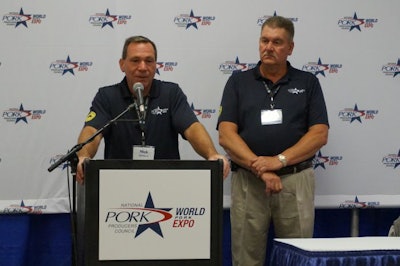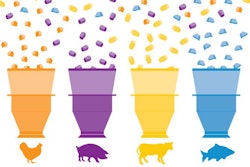
Ongoing trade issues and North American Free Trade Agreement (NAFTA) negotiations were hot topics as the National Pork Producers Council (NPPC) kicked off its meeting at the 2018 World Pork Expo in Des Moines, Iowa, this week.
“Trade is on everyone’s mind,” said Jim Heimerl, NPPC president. “Mexico put tariffs on U.S. pork. That follows a 25 percent additional duty China put on April 2. Those moves were retaliation for U.S. tariffs placed on steel and aluminum."
Heimerl referenced Iowa State University agriculture economist Dermot Hayes when explaining that, since March 1, hog futures have dropped by 18 dollars per head.
“That is a $2.2 billion industry loss on an annualized basis,” Heimerl said.
After Mexico’s recent decision and the ongoing issues with China, there is no doubt rural America will suffer.
“This needs to be figured out now,” he said.
Optimism despite challenges
Producers are worried and, while NPPC staff members are doing their best to take calls and express producer concerns to the Trump administration, it’s still an uncomfortable feeling. However, Heimerl said he is still optimistic that positive change will occur.
“We are the biggest single sector in the United States that’s taking it on the chin,” said Nick Giordano, NPPC vice president and counsel, global government affairs.
Giordano gives pork producers a lot of credit for their patience with the Trump administration as these complex trade issues continue to change.
“We are working closely with President Trump, (Agriculture) Secretary (Sonny) Perdue and the administration, and the message has been and continues to be this is really hard for producers,” Giordano said.
Mexico is the largest importer of U.S. pork and China is third. Last year, the U.S. pork industry exported $6.5 billion worth of product.
“We appreciate the variety of interests and issues the Trump administration is balancing in its trade negotiations with Mexico, China and other countries. While producers are trying to be good soldiers, we’re taking on water fast,” Heimerl said.
The single most important thing people can do regardless of their political view is eat more pork, Giordano said. When asked if the desire for U.S. pork may override the issues associated with tariffs, Heimerl said he didn’t believe so and that ultimately politics dominate overall.
Producers should keep in mind this is a tariff, not a shutout, he said. Canada has shown no signs of retaliatory tariffs at this time and NPPC members are hopeful it will not.
Continued trade issues
While NAFTA also continues to be a concern for U.S. pork producers, NPPC is looking to advance trade in areas of the world where U.S. pork has not previously been prominent, like India and Brazil. Heimerl explained that while producers were excited with the recent opportunities offered by exports to Argentina, that individuals should keep in mind it takes almost 100 Argentinas to equal China's size.

















